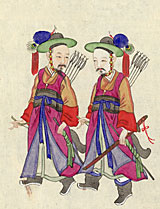
Anacostia Community Museum Archives
Archives Center, National Museum of American History
Eliot Elisofon Photographic Archives, National Museum of African Art
Freer Gallery of Art and Arthur M. Sackler Gallery Archives
Hirshhorn Museum and Sculpture Garden Collection Archive
National Air and Space Archives
National Anthropological Archives
National Museum of the American Indian Archive Center
Ralph Rinzler Folklife Archives and Collections, Center for Folklife and Cultural Heritage
Research & Scholars Center, Smithsonian American Art Museum
Smithsonian Institution Archives
Smithsonian Institution Libraries
![]()

Men
in Military Costume with Weapons. Colored pencil and watercolor on paper.
Collected by Robert W. Shufeldt at Ch'oryang, South Kyongsang Province,
South Korea, 1886.
National
Anthropological Archives
Museum Support Center
4210 Silver Hill Road
Suitland, Maryland 20746
301.238.1300
301.238.2883 fax
naa@si.edu
www.nmnh.si.edu/naa
Hours
Tuesday - Friday
9am to 4:30pm
Appointment Required
Metro Stop: Suitland
The
National Anthropological Archives is the nation's only repository dedicated
exclusively to preserving ethnographic, archaeological, and linguistic
fieldnotes, physical anthropological data, photographs, sound recordings
and other media created by American anthropologists. Since 1968, the NAA
has collected the papers of non-Smithsonian anthropologists including
John Honigmann, Ruth Landes, Timothy Asch, Paul Riesman, and Joel Halpern,
to name a few. With a mission to document the world's peoples and cultures,
past and present, the archives also collects similar cultural materials
produced by non-anthropologists. In addition to the papers of Smithsonian
anthropologists, it also preserves the records of anthropological organizations
as well as materials of use to anthropologists. The Archives' 8,250 linear
feet of fieldnotes, photographs, correspondence, journals, sound recordings,
and works of art are available for use through visits to the reading room
and, as possible, through correspondence. More than 53,000 digital images
are now available. Most of these images are available through SIRIS,
the Smithsonian's online catalog.
Highlights: Established in 1879 as the archives of the Bureau of American
Ethnology, the NAA's holdings include ethnological and linguistic documents
concerning North American Indians collected by the Smithsonian Institution
since the 1850's and by federal geological surveys during the 1870's.
George Gibbs, John Wesley Powell, and Franz Boas are among the very many
anthropologists who contributed to the collection. Archaeological documents
include materials of Cyrus Thomas' survey of mounds east of the Rocky
Mountains, periodic reports of the Work Projects Administration, and
the
records of the River Basin Surveys, as well as materials of individual
archaeologists and a collection of so-called "grey" literature.
There is also a large photograph collection of original glass film
negatives
and vintage prints, the largest and best documented collection of 19th
century Plains Indian drawings on paper (including ledger book drawings).
There is a small but important collection of sound recordings, including
material collected by John P. Harrington, James Henri Howard, and John
Lyle Fischer. The NAA also houses over 23,000 items of artwork, most
of North American origin produced by native people. More recent acquisitions
include documents and photographs concerning cultures in all parts of
the world. Collections of surprising richness can be found for virtually
all parts of the world. Large portions of the Archives records serve
to document the Department of Anthropology's extensive ethnological,
archaeological,
and physical anthropology collections. Researchers
will find complementary film, video, sound and
photographic collections
in the Human Studies Film Archives.
The NAA also holds records of national and regional organizations, including
the American Anthropological Association and the Society for American
Archaeology. In addition, there are records of Indian organizations,
most notably the National Congress of American Indians. Given the NAA's
strong
historical focus on North American anthropology, many Native Americans
use the collections to study their cultural past.